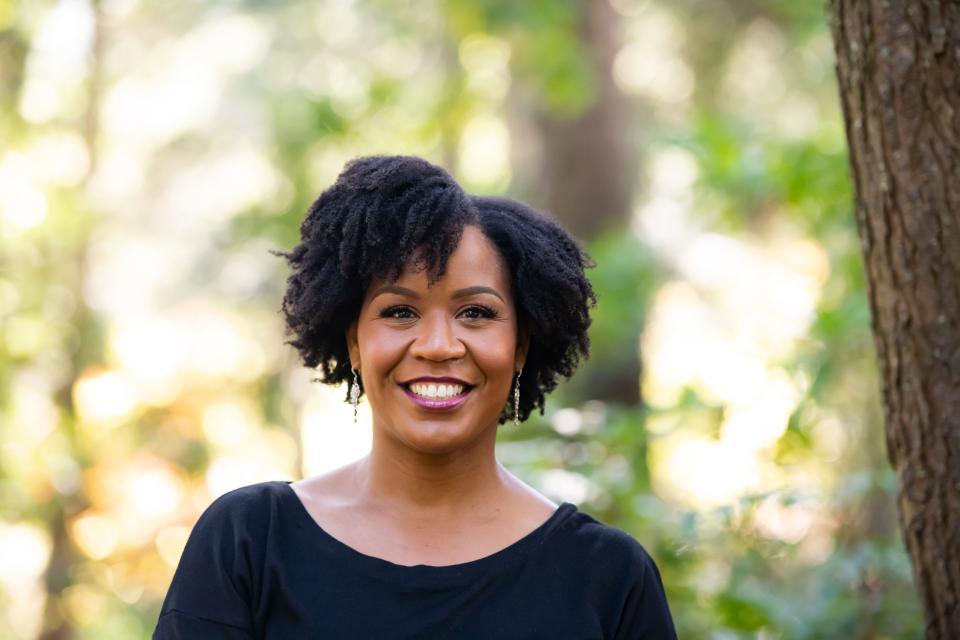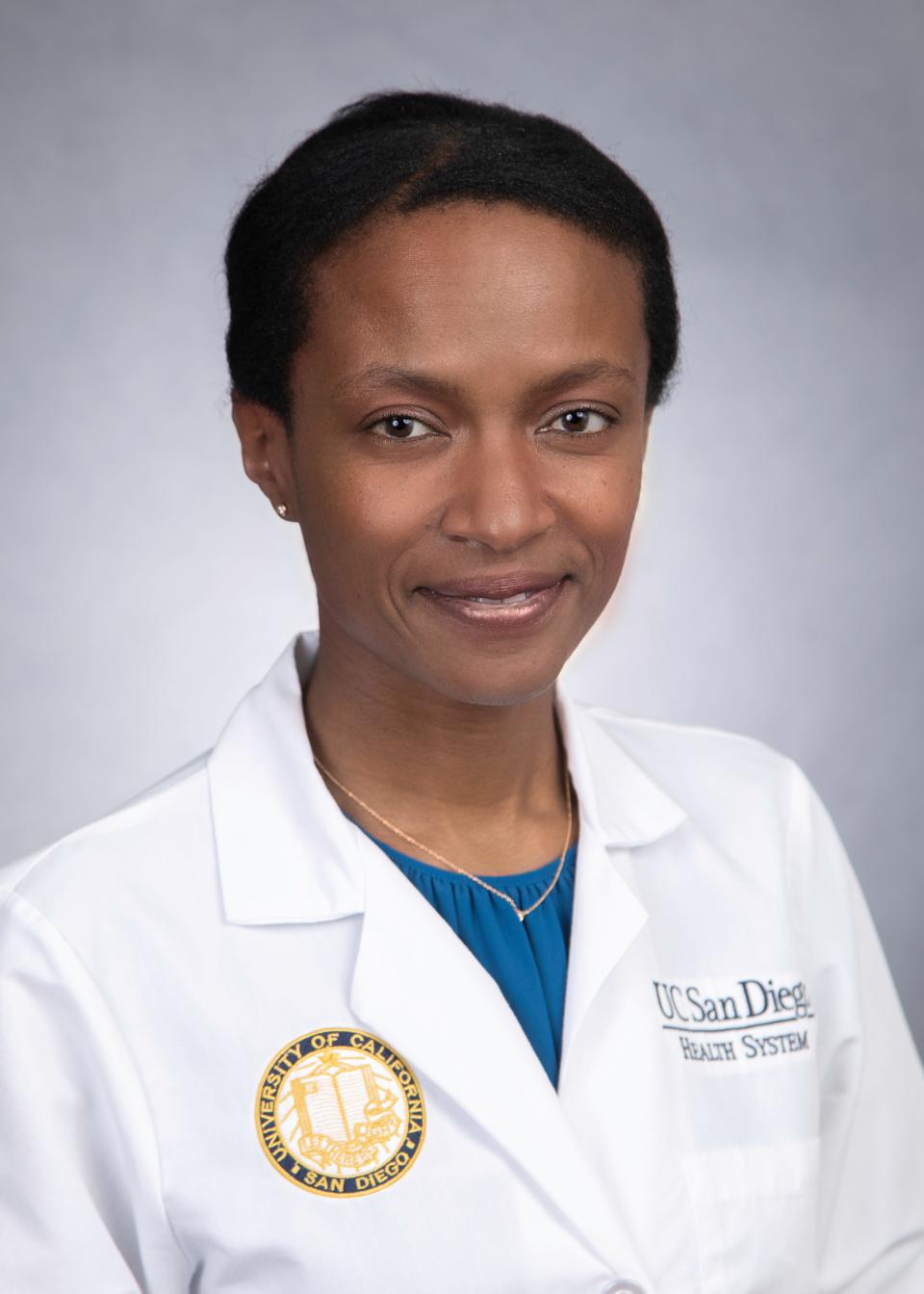Homicide is a leading cause of death during pregnancy. These women are more likely to be killed.
Andreae Lloyd was working an overnight shift at the Miami-area group home she managed when she called her godmother to say she was ready to leave her boyfriend of 11 years.
A mom to two young boys with another baby on the way, Lloyd said she just couldn’t take the turbulent relationship anymore.
“I’m really done, Ma,” Lloyd told Alfreda Lyons the night of Dec. 6. “I'm serious this time. I can’t do this. He is never going to change.”
“I love you, Lady,” Lloyd added, before hanging up. “We’ll talk tomorrow.”
But tomorrow never came.
An hour after that call around midnight, Lloyd, 27, answered a knock on the door to find her boyfriend. Within moments, he began beating her, then dragged her into a white Honda civic and sped away, police said. The disturbing scene was caught on surveillance video.
That morning, Lloyd didn’t return texts, and family reported her missing.
The pregnant woman’s remains were found the next day inside a metal box in a remote, heavily wooded area. Xavier Johnson, 32, who confessed to the crime, faces murder charges.
Lloyd is not an outlier.

Homicide was the leading cause of death for pregnant and postpartum women in the U.S. in 2018 and 2019 – exceeding all top causes of maternal death “by more than twofold,” found authors of a recent study published in Obstetrics and Gynecology. Pregnant Black women like Lloyd were killed at significantly higher rates.
The rates could be even higher because data collection is uneven, experts say. The Centers for Disease Control and Prevention, for example, does not track maternal homicide as a pregnancy-related death.
Multiple studies using data from other years echo the new study's findings. One review found homicide, along with suicide and overdoses, the leading causes of pregnancy-associated deaths.
Experts say the alarming statistics reflect a grave nationwide public health concern, with the inequity adding urgency to widen the lens on maternal mortality causes, track them better and raise domestic violence awareness.
As a Black woman in the field, Dr. Andrea Jackson, an obstetrician and gynecologist and professor at the University of California, San Francisco, said the findings triggered anger and sadness.
“It felt, to me, a call to action for all of us in obstetrics,” Jackson said. “This whole system needs to be built with the most vulnerable at the center, then everyone gets high quality care … With the most vulnerable, you see it playing out in very tragic ways.”

Pregnant women and girls were 16% more likely to be killed than nonpregnant and non-postpartum women, the study found, and nearly seven of 10 pregnancy homicides involved a firearm. Of the more than 4,700 women and reproductive-aged girls killed in the U.S., almost 6% were pregnant or a year postpartum.
Most of those women, the authors found, were Black or younger than 25.
The deaths are seen in other recent news reports across the nation.
As she unloaded gifts from her own baby shower on the night of Nov. 20, Jessica Covington, a 32-year-old Black woman, was shot multiple times and killed. The Philadelphia woman was seven months pregnant. She’d just started her own salon business.
In Memphis, Tennessee, Ashanti Smith, 26, was five months pregnant with her third child, a baby boy, when she was shot and killed earlier this month. Her two toddlers will grow up without their mom.
Days later in Houston, police arrested the boyfriend of Cavanna Smith on murder charges after the 25-year-old was shot in the head and killed a day after her first ultrasound in October.
And on Wednesday in Jackson, Mississippi, Keyunta McWilliams, 23, was eight months pregnant when she was shot and killed, local news outlets reported. She and her unborn child died at the scene.
Pregnant or postpartum Black women and girls were more than three times as likely as white women to be killed by an intimate partner, the study found, and eight times more likely than non-pregnant Black women.
Reasons for the disparity are complex, the researchers wrote, and "may include racial inequity in unintended pregnancy (which has been associated with intimate partner stress, conflict, and violence) and racism within maternity care settings that may prevent girls and women from disclosing victimization."
Florida State University's Dr. Suzanne Harrison, a family physician who sits on a local domestic violence fatality review team, said advocates shouldn't underestimate targeting those extra stressors, as well as food insecurity, transportation barriers to health care and other disparities.
"That might relieve some of the stress enough that it makes the situation and the relationship less contentious, less volatile, less likely to have a severe beating, ongoing emotional or psychological abuse," she said.
Implementation of national standards and recommendations for domestic violence screenings have been “inadequate,” the authors added.
Harrison and other experts said clinicians need to be more proactive in screening for signs of domestic violence during prenatal appointments, as many reasons could deter a woman from sharing with her doctor.
"We really need to be screening for this, not once, not twice, but probably at every visit while a woman is pregnant or coming in for her postpartum visit," she said. "If the patient chooses to tell you 'no,' that's not the end of the story."
Jackson pointed to research showing Black women are more likely to have child protection services called on them and less likely to be believed when reporting violence at home.
“These all wrap up into this larger problem that we have in the United States in terms of systemic racism,” she said. Non-Black providers “really need to be aware of the fact that they may need to go the extra mile with their patients when having these discussions.”
Johns Hopkins University nursing department chair and professor Jacquelyn Campbell, a widely recognized expert in domestic violence and homicides, created the Danger Assessment used in clinical settings today.
“Most of the time, abuse during pregnancy and around the time of pregnancy does not escalate to a homicide. One of the things we need to work on, is what differentiates those cases where it does escalate to a homicide,” Campbell said. “We have to do a better job in prenatal care, helping pregnant women disclose if they're being abused.”
Her studies have found that in cases in which the perpetrator of the homicide is identified, the assailant is most often an intimate partner. Abusive partners are often obsessively jealous and controlling, Campbell said.
In Lloyd's case, her godmother wasn't aware of violence in her relationship, but noticed Lloyd calling her boyfriend each time she went dress shopping for "his approval" to wear the dress out, she said.
Clinicians need to spend time helping women open up about these relationship traits as well as questioning about guns in the home, Campbell said.
“I’ve interviewed thousands of abused women,” she said. “I'll never forget one woman who told me that her husband tried to drown her while she was pregnant, held her underwater to get her to admit that the baby wasn't his. And it was. It was his.”
Community service organizations, along with clinicians, also need to be aware if a pregnant woman is living in a high-crime neighborhood, Campbell said.

“If a woman's pregnant and she's living in a highly dangerous neighborhood, it's not like the obstetrician is going to be able to magically get her into a better living situation or a better neighborhood, but they do need to think about that” and refer her to services or shelters, she said.
Dr. Allison Bryant, senior medical director for health equity at Mass General Brigham health system, said groups that review domestic violence deaths at the local level should work with community-based domestic violence organizations and those who conduct maternal mortality reviews. Teams typically work in "silos," she said.
“We know that pregnancy itself can be a trigger for intimate partner violence or other kinds of violence," Bryant said. "Maternal mortality review committees probably could take a much closer look at some of these deaths and really understand what are the contributors, what can we do in the public health policies here that might help to mitigate some of these awful deaths.”

Perinatal epidemiologist Dr. Cynthia Gyamfi-Bannerman, chair of the OBGYN department at the University of California, San Diego, called the study "eye opening." She said health care workers need to think about “holistic” interventions.
“The bottom line here is that we need to, as clinicians and obstetric providers, really start to think about the non-medical causes of maternal mortality, with homicide being one of the leading causes now that's been identified,” she said. “It is a public health issue."
Last month, President Biden signed into law the first bill in the Black Maternal Health Momnibus Act, intended to improve maternal health outcomes. However, it does not mention perinatal homicide in the general public. When it comes to domestic violence, the bill targets "violence against pregnant or postpartum individuals" among those incarcerated in jails and prisons.
In Miami, Lyons wants there to be more awareness of the dangers faced by women like her goddaughter, so others might be spared.
"Please say something," Lyons said. "It will save your life. We lost her because we did not know."
She is still grappling with the loss of Lloyd, who called her playfully every day to make sure she was up for work, and whose nurturing personality shined when she visited, volunteering to clean the refrigerator or make Lyons' favorite Bahamian oxtail dish.
On Monday, Lloyd would have turned 28. To celebrate her life, her family sent off dozens of balloons in her favorite color pink into the sky. Her funeral was held Saturday.
"I'm just going to miss so many things. The little things," Lyons said. "She mattered ... she mattered to us. This shouldn't have happened to her."

Reach Nada Hassanein at nhassanein@usatoday.com or on Twitter @nhassanein_.
This article originally appeared on USA TODAY: Black pregnant women are being killed at higher rates

